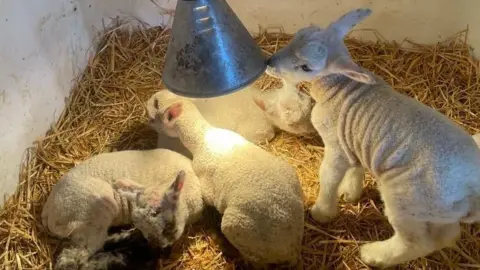Number of people ill from petting farm hits 89
 BBC
BBCThe number of people who have contracted a parasitic infection after attending calf and lamb feeding sessions at a farm in south Wales has risen to 89.
There have been eight new cases of cryptosporidium confirmed by Public Health Wales (PHW), all linked to visits to Cowbridge Farm Shop at Marlborough Grange Farm in Cowbridge, Vale of Glamorgan, during March and April.
PHW previously said the infection led to 16 people requiring hospital care for at least one night, including a four-year-old boy.
The farm shop, which the BBC has approached for comment, voluntarily suspended its feeding and petting sessions on 29 April and is cooperating fully with the ongoing investigation, PHW said.
Cryptosporidium is commonly associated with contact with farm animals, and can spread easily from person to person and poses increased risk to young children and those with weakened immune systems.
Symptoms typically appear two to 10 days after exposure and can last for up to two weeks.
PHW warned infection can still spread after symptoms subside and has urged those affected not to go swimming for two weeks.
Susan Mably, consultant in health protection at PHW, said: "Cryptosporidium usually clears up on its own, but it can cause more serious illness in young children and people with weaker immune systems."
She added that the infection can be spread from person to person and the key is "washing your hands properly".
Officials from PHW and other agencies met on 24 May for the fifth time since the outbreak began, to co-ordinate the response.
Visitors to petting farms are being reminded to avoid close contact with animals, supervise children closely, and wash hands thoroughly with soap and warm water after touching animals or walking around a farm.
Alcohol hand gels do not provide sufficient protection.
Pregnant women are also being advised to steer clear of new-born lambs during lambing season due to a higher risk of infection.
What is cryptosporidium?
Cryptosporidium is a microscopic parasite that can cause an unpleasant and sometimes dangerous illness called cryptosporidiosis.
It lives in the intestines of infected humans and animals and is passed out in their poo.
It can then spread to water sources such as lakes, rivers, and swimming pools, as well as food like raw milk.
The illness can affect anyone but is most common in children aged one to five.
Symptoms, which can last for around two weeks, include severe watery diarrhoea, vomiting, stomach cramps, nausea, fever, and loss of appetite.
There is no specific treatment but most people feel better within a month.
